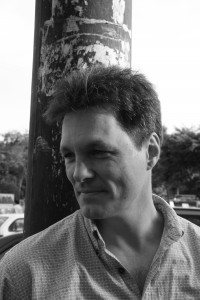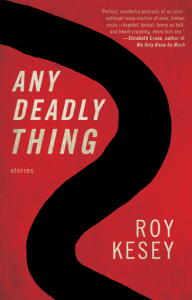 We are pleased to welcome published author Roy Kesey to Writers on Craft today. His latest book is a short story collection called Any Deadly Thing, published in February 2013 by Dzanc Books. His other books include the novel Pacazo (winner of the Paula Anderson Book Award), All Over, a collection of short stories (one of The L Magazine’s Best Books of the Decade), a novella called Nothing in the World (winner of the Bullfight Media Little Book Award), and two historical guidebooks. His short stories, essays, translations and poems have appeared in more than a hundred magazines and anthologies, including Best American Short Stories and The Robert Olen Butler Prize Anthology. He currently lives in Maryland with his wife and children.
We are pleased to welcome published author Roy Kesey to Writers on Craft today. His latest book is a short story collection called Any Deadly Thing, published in February 2013 by Dzanc Books. His other books include the novel Pacazo (winner of the Paula Anderson Book Award), All Over, a collection of short stories (one of The L Magazine’s Best Books of the Decade), a novella called Nothing in the World (winner of the Bullfight Media Little Book Award), and two historical guidebooks. His short stories, essays, translations and poems have appeared in more than a hundred magazines and anthologies, including Best American Short Stories and The Robert Olen Butler Prize Anthology. He currently lives in Maryland with his wife and children.
What do you read when you despair at the state of either your work or modern literature–any “go to” texts?
I can’t imagine despairing at something as varied and vivid and unshakably present as modern literature—can’t imagine how that despair would come to be, or what form it would take, or what would be the point. But, sure, lots of go-to texts, regardless of how my own work is going. Some of the fiction: Calvino’s Invisible Cities, Carson’s Nox, Barthelme’s Sixty Stories, Cortázar’s Rayuela, Morrison’s Beloved, Johnson’s Jesus’ Son, Duras’ L’Amant, Williams’ Vicky Swanky is a Beauty, Sebald’s The Rings of Saturn, Robinson’s Housekeeping…
If you could give just one piece of advice to emerging authors about editing that has served you well, what would it be?
1a. It’s never, ever, ever good enough. Work on a draft until you reach a point of preposterously diminished returns. Then let it sit a month, and start a new draft.
1b. Never take advice from other writers. They only know what worked (or didn’t) for them the last time they tried.
Has your way of finding a path into new work changed over time?
Not really—not at the levels that matter. I guess maybe I do a bit more arc-thinking than I used to, both across a given text and amongst related texts, but down in the mud of actual writing, it’s the same as ever: get a new bit of diction incoming, and hang on tight.
What do you feel is the purpose of literature?
We make ourselves manifest in the world, and confirm ourselves manifest t/here, in tons of ways. Literature is the smartest and coolest and funnest of the ways. Also, the best kisser. Of course, I say that as a person who does not know how to paint or design buildings or compose music or sculpt or manufacture or plumb or garden or bowl.
As a human being, what is the best advice you have to offer?
Stop, drop, and roll.
You write poetry, essays, historical guidebooks, stories, novels, and more. What usually sparks your decision to follow a given impulse on any given writing day?
 Deadlines and contracts help. There’s great impetus to be found in knowing that someone else, generally someone I like and respect, can’t start doing their job until I finish doing mine. And the closer something gets to being finished, the more important it is to me to see it through—to make sure that all those hours/months/years of time and energy and desire pay off in the form of some new and hopefully worthy thing coming into the world.
Deadlines and contracts help. There’s great impetus to be found in knowing that someone else, generally someone I like and respect, can’t start doing their job until I finish doing mine. And the closer something gets to being finished, the more important it is to me to see it through—to make sure that all those hours/months/years of time and energy and desire pay off in the form of some new and hopefully worthy thing coming into the world.
Beyond that, it’s just a matter of finding something (in the world, on a bookshelf, in the fat file of “Stuff Underway” or the fatter one called “Good Ideas?”) that radiates urgency of some kind—aesthetic, intellectual, emotional, whatever. So that’s Project A. I usually only work on a single thing on any given day, and I’ll work on Project A every day until a given draft is done. Then I’ll set it aside and head to the world/bookshelf/files to find Project B. I’m always eager to get back to Project A, though, and will make excuses to work on it again as soon as I feel like the old draft is anywhere near ripe enough.
What’s recently released or in the pipeline for your readers? Give us a sneak peek.
In the pipeline: a novella, a novel, a translation, all at different stages of projectness. As for recently released, here’s a little chunk from the start of “Nipparpoq,” a story first published a few years back in a fantastic magazine called Ninth Letter, and now appearing in Any Deadly Thing, my new collection from Dzanc.
“It is nearly dark. Stand very still. There is nothing that can be done about the cold. It has been nearly dark for the past twelve hours, and soon it will be completely dark. Stand very still and do not think about the cold.”
Writers on Craft is hosted by Heather Fowler, who cares about writing. She does a lot of it. Visit her profile on Fictionaut or see here for more: www.heatherfowlerwrites.com.
May 16th, 2013 at 1:17 am
“down in the mud of actual writing, it’s the same as ever: get a new bit of diction incoming, and hang on tight.”
Ain’t that the truth.
May 20th, 2013 at 10:42 pm
“Never take advice from other writers.”
Advice not taken…
;-)
May 25th, 2013 at 2:52 am
Really enjoyed this interview, and I find myself gullibly bowing down to the advice given despite the warning on the package because you mentioned Calvino, Cortázar and Sebald as favorites—all three are high on my list also (plus, they’re not from the US, which means you get around more than others, so we must be brothers). Looking forward to checking out more of your work!
May 28th, 2013 at 6:54 pm
Marcus-
Shameless
Self-Other-Suck-Uppeges
Typical.